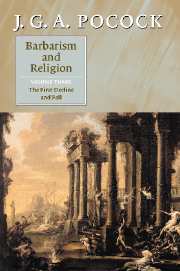Book contents
- Frontmatter
- Contents
- Acknowledgements
- Note on usages
- List of abbreviations
- Introduction
- PROLOGUE
- 1 Gibbon's first volume: the problem of the Antonine moment
- PART I THE FIRST DECLINE AND FALL: ANCIENT PERCEPTIONS
- PART II THE AMBIVALENCE AND SURVIVAL OF CHRISTIAN EMPIRE
- PART III THE HUMANIST CONSTRUCTION OF DECLINE AND FALL
- 8 Leonardo Bruni: from translatio to declinatio
- 9 Flavio Biondo and the decades of decline
- 10 Niccolo Machiavelli and the imperial republic
- PART IV EXTENSIVE MONARCHY AND ROMAN HISTORY
- PART V REPUBLIC AND EMPIRE: THE ENLIGHTENED NARRATIVE
- PART VI GIBBON AND THE STRUCTURE OF DECLINE
- EPILOGUE
- Bibliography of works cited
- Index
10 - Niccolo Machiavelli and the imperial republic
Published online by Cambridge University Press: 15 December 2009
- Frontmatter
- Contents
- Acknowledgements
- Note on usages
- List of abbreviations
- Introduction
- PROLOGUE
- 1 Gibbon's first volume: the problem of the Antonine moment
- PART I THE FIRST DECLINE AND FALL: ANCIENT PERCEPTIONS
- PART II THE AMBIVALENCE AND SURVIVAL OF CHRISTIAN EMPIRE
- PART III THE HUMANIST CONSTRUCTION OF DECLINE AND FALL
- 8 Leonardo Bruni: from translatio to declinatio
- 9 Flavio Biondo and the decades of decline
- 10 Niccolo Machiavelli and the imperial republic
- PART IV EXTENSIVE MONARCHY AND ROMAN HISTORY
- PART V REPUBLIC AND EMPIRE: THE ENLIGHTENED NARRATIVE
- PART VI GIBBON AND THE STRUCTURE OF DECLINE
- EPILOGUE
- Bibliography of works cited
- Index
Summary
We now possess a series of layered concepts – deposited as it were by history in a sequence of surviving texts – which may be said to constitute a notion of ‘the decline and fall of the Roman empire’. If we arrange them in historical sequences, these nearly anticipate the process they come to describe, beginning with a Sallustian (it could also be a Polybian) moment at which the imperium won by libertas is seen subverting the virtus on which the libertas depends. This account was preserved through the medieval centuries by the successors of Orosius and Augustine, for whom it signified that Roman virtus was no more than a worship of glory, doomed to share the fate of the civitas terrena. In the thirteenth century and after, however, this virtus was enlarged into a much fuller code of political and social living, and in the fifteenth we have seen it restored to something like its original meaning; the Caesars are denounced for destroying the citizen elites among whom libertas and imperium were possible, and so depriving Rome of the virtus which defended imperium against the barbarians.
Orosius and Augustine were not much interested in what we are terming Gibbon's ‘first decline and fall’, the Tacitean narrative of how the principate set up by Augustus failed to keep control of its succession problem and its armies; this was one reason why Julius rather than Augustus Caesar came to be imprecisely considered the first princeps et imperator who had destroyed the republic.
- Type
- Chapter
- Information
- Barbarism and Religion , pp. 203 - 236Publisher: Cambridge University PressPrint publication year: 2003

